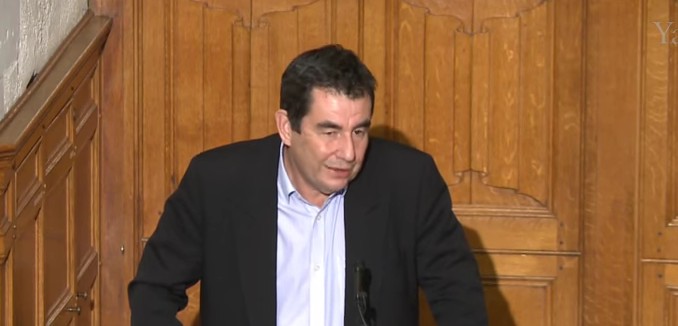The nuclear deal agreed to last week has become a “horror story,” that will “[ensure] the establishment of a new Iranian nuclear program, which will be immeasurably more powerful and dangerous than its predecessor,” according to Ari Shavit, a senior Israeli reporter who is frequently critical of Prime Minister Benjamin Netanyahu, in a column he wrote yesterday for Ha’aretz.
While Shavit believes that the Joint Comprehensive Plan of Action (JCPOA) does a good job of limiting Iran’s existing program, he argues that it also empowers Iran to develop a more extensive and powerful program in the future.
Now for the darkness: In the Vienna agreement, the United States, European Union, Britain, France, Russia and China recognize again and again Iran’s right to develop advanced centrifuges. These centrifuges’ enrichment capacity could be 5-10 times bigger than the capacity of the old ones, which Iran is now foregoing.
This means that the international community is not only enabling, but actually ensuring the establishment of a new Iranian nuclear program, which will be immeasurably more powerful and dangerous than its predecessor. In fact the Iranians are giving up an outdated, anachronistic deployment in order to build an innovative legitimate one, with the world’s permission and authority.
Shavit contends that this would allow Iran to “[become] in 2025 a muscular nuclear tiger ready to spring forward, with an ability to produce dozens of nuclear bombs.”
Shavit was not only bothered by the future outcomes of the JCPOA, but also with the tone of the agreement.
After many hours of reading I had to stop. The thriller had become a horror story. Not only was the content inconceivable, the tone was, too. The fact is that in each chapter Iran’s dignity is preserved, but the U.S. and Europe’s isn’t. The fact is that the Iranian Islamic Consultative Assembly, or Majlis, has a much higher status in the agreement than the American Congress. The fact is that Iran is unrepentant, does not promise a change of course and takes an almost supercilious attitude toward the other parties. As though it had been a campaign between Iran and the West, and Iran won and is now dictating the surrender terms to the West.
An example of Shavit’s observation is found in a section of the JCPOA (pdf) that addresses how Iran and the P5+1 powers may confront suspicions that either party is in non-compliance with the deal’s obligations, and seemingly draws an equivalence between the two.
If Iran believed that any or all of the E3/EU+3 were not meeting their commitments under this JCPOA, Iran could refer the issue to the Joint Commission for resolution; similarly, if any of the E3/EU+3 believed that Iran was not meeting its commitments under this JCPOA, any of the E3/EU+3 could do the same.
The United Nations Security Council (UNSC) sanctions were imposed due to Iran’s non-compliance with the Nuclear Nonproliferation Treaty (NPT).
Following the vote by the UNSC, Iran’s President Hassan Rouhani stated:
“Iran sought to establish its right to enrichment, and today, the UNSC has explicitly acknowledged our country’s enrichment right,” Rouhani said during a cabinet session on Wednesday.
The six countries that were parties to the negotiations on Iran’s nuclear program admitted that the anti-Iran sanctions had been ineffective, the Iranian president said, adding that the UNSC, which itself imposed a series of sanctions on Tehran, unanimously endorsed a draft resolution on the lifting of the bans.
In summing up his final impression of the deal, Shavit stated, “The fact is that Iran is unrepentant, does not promise a change of course and takes an almost supercilious attitude toward the other parties. As though it had been a campaign between Iran and the West, and Iran won and is now dictating the surrender terms to the West.”
[Photo: Yale University / YouTube ]




